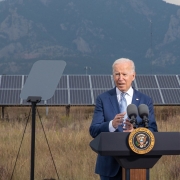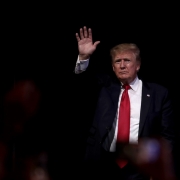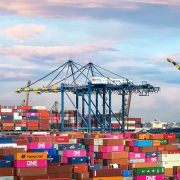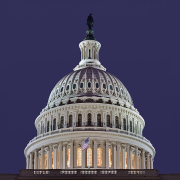How America’s Division Empowers Putin
For more than a decade, Vladimir Putin has sought to sow division and undermine American democracy. Now that he’s distracted by the conflict unfolding in Ukraine, his successor has stepped into the spotlight: America’s political class.
Once wars united people, but not in modern America. Here, the vast majority of citizens share remarkably similar opinions about Russia’s invasion of Ukraine: that it should be condemned outright. Our politicians, however, seem blissfully unaware of this.
In Congress last week, despite strong pro-Kyiv sentiment among the vast majority of Republicans, pro-Trump acolytes constituted the largest faction of those who voted against supplying aid to Ukraine. Yet on this issue, there is little to distinguish them from the Democratic Socialists of America, who have called for America’s exit from the “imperialist” Nato. There are even some on the far-Left who believe the West’s sympathy for Ukrainians reflects our unredeemable racism.
And yet the past fortnight has revealed something more optimistic than the intellectual adolescence of America’s politicians. The key to repelling Putin’s campaign of division in the West has also become apparent: unifying around basic economic interests.
Much attention has been paid in recent years to Russian online interference in our elections. But it is tangible realities — such as oil, food, and the ability to build things — that will determine our ability to resist external autocratic forces. And it is here that energy policy becomes crucial.
Before Biden became President, America was well on its way to energy independence, and emerged as the world’s leading gas exporter. Far more than words or military threats, the US energy revival was a blow to Russia, Iran and Saudi Arabia. American production was a critical factor in weakening the price of the one commodity that keeps their economies alive.
Yet this weapon is being systematically dismantled. Since taking the White House, Biden has turned the Federal Reserve and other executive departments into enforcers of “net zero” policies. From the very beginning, Biden and his green allies have busily cancelled gas pipelines, ended new leases for offshore oil, and introduced new regulations that make it harder to build new fossil fuel plants. All of this was manna for Moscow.
Biden’s energy policies, so poorly timed amid the prospect of a looming Russian invasion, has also widened a deeper, more long-lasting schism that will reverberate for years to come. Perhaps more than anything else, it seems certain to expand both class and geographic divisions.
Read the rest of this piece at UnHerd.
Joel Kotkin is the author of The Coming of Neo-Feudalism: A Warning to the Global Middle Class. He is the Roger Hobbs Presidential Fellow in Urban Futures at Chapman University and Executive Director for Urban Reform Institute. Learn more at joelkotkin.com and follow him on Twitter @joelkotkin.
Photo credit: Werner Slocum / NREL, via Flickr, under CC 2.0 License.

 NREL, used under CC 2.0 License
NREL, used under CC 2.0 License
 Barrett Ward, CC 0.0 License
Barrett Ward, CC 0.0 License D. Ramey Logan, used under CC 3.0 License
D. Ramey Logan, used under CC 3.0 License



